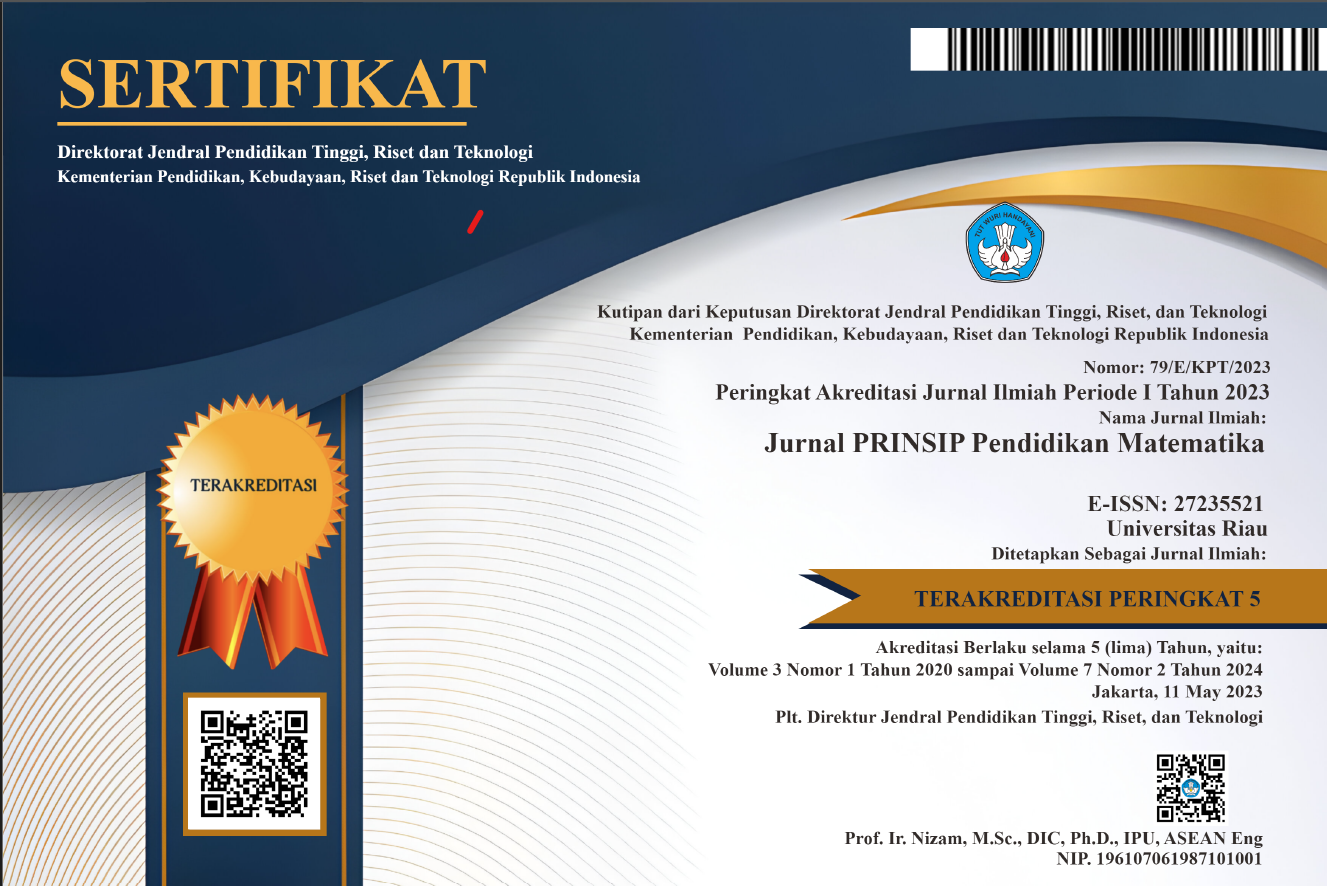DEVELOPMENT OF MATHEMATICS LEARNING DEVICES WITH PROBLEM-BASED LEARNING MODEL ON SOCIAL ARITHMETIC MATERIALS FOR CLASS VII SMP/MTs
Abstract
The implementation of the 2013 curriculum well is determined by developing learning tools. This research produces learning tools in the form of syllabus, lesson plans, and student worksheets with Problem Based Learning models on Social Arithmetic material. This research is a research and development (R&D) using a 4D model. The instrument in this study was a validity instrument in the form of a validation sheet used to validate the syllabus, lesson plans, and LKPD, as well as a practical instrument in the form of a student response questionnaire to determine the practicality of using LKPD. The average score of the syllabus validation results is 3.48 and is categorized as very valid. This shows that the syllabus can be tested. The average score of the RPP validation results is 3.48 and is categorized as very valid. This shows that the RPP can be tested. The average score for LKPD validation is 3.51 and is categorized as very valid. This shows that the LKPD can be tested. The average student response questionnaire results score is 3.47 and is categorized as very practical.
Downloads
References
Arikunto, S. (2010). Prosedur Penelitian Suatu Pendekatan Praktik. In Jakarta: Rineka Cipta.
Hanggara, Y. (2012). Analisis Sistem Informasi Pengelolaan Data Alumni Sekolah Berbasis Codeigniter Php Framework. Universitas Negeri Yogyakarta.
Nadhifah, G., Afriansyah, E. A., & Learning, P. B. (2016). Peningkatan Kemampuan Pemecahan Masalah Matematis Siswa dengan Menerapkan Model Pembelajaran Problem Based Learning dan Inquiry PENDAHULUAN Dari beberapa mata pelajaran yang di pelajari siswa , matematika merupakan satu ilmu yang sangat penting dalam duni. 5(3), 33–44.
Reiza Mustika Noer, Y. A. (2018). Pembuatan Siroline (Sistem Informasi Rapor Online) Berbasis Web Menggunakan Framework Laravel. IT-Edu : Jurnal Information Technology and Education, 3(2), 35–43.
Rinaldi, E., & Afriansyah, E. A. (2019). Perbandingan Kemampuan Pemecahan Masalah Matematis Siswa antara Problem Centered Learning dan Problem Based Learning. NUMERICAL: Jurnal Matematika Dan Pendidikan Matematika, 3(1), 9–18. https://doi.org/10.25217/numerical.v3i1.326
Setyono, D., & Sutarni, D. S. (2013). Seminar Nasional Pendidikan Matematika Surakarta. 15.
Siregar, H. M., Solfitri, T., & Siregar, S. N. (2022). Development of E-Worksheet of Integration Technique Rational Functions Different Linear Factors to Improve Mathematical Creative Thinking Skills. 2021 Universitas Riau International Conference on Education Technology (URICET-2021), 35–40. https://ices.prosiding.unri.ac.id/index.php/ICES/article/view/7975
Siregar, H. M., Solfitri, T., Siregar, S. N., Anggraini, R. D., & Aldresti, F. (2022). Analisis Kebutuhan E-LKM Kalkulus Integral Untuk Meningkatkan Kemampuan Berpikir Kreatif Matematis. RANGE: Jurnal Pendidikan Matematika, 4(1), 55–70. https://doi.org/https://doi.org/10.32938/jpm.v4i1.2664
Sudijono, A. (2011). Pengantar Statistik Pendidikan. Rajawali Pers.
Sugiyono. (2019). Metode Penelitian & Pengembangan Research and Development. Alfabeta.
Yunia, N., & Zanthy, L. S. (2020). Kesalahan Siswa Smp Dalam Menyelesaikan Soal Cerita Pada Materi Aritmatika Sosial. Teorema: Teori Dan Riset Matematika, 5(1), 105. https://doi.org/10.25157/teorema.v5i1.3206
Copyright (c) 2022 Jurnal Prinsip Pendidikan Matematika

This work is licensed under a Creative Commons Attribution-NonCommercial-ShareAlike 4.0 International License.





